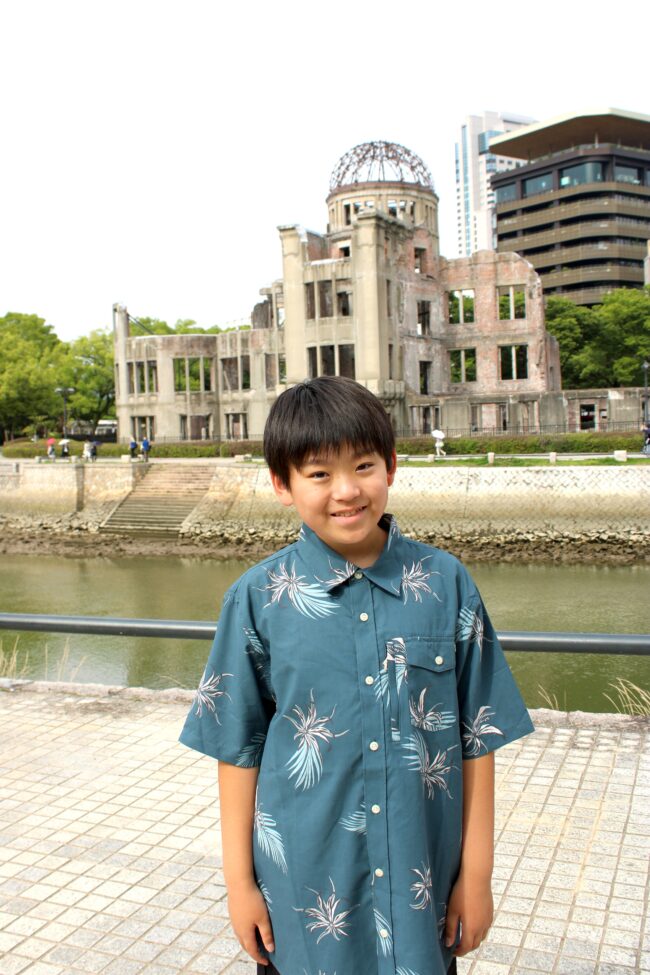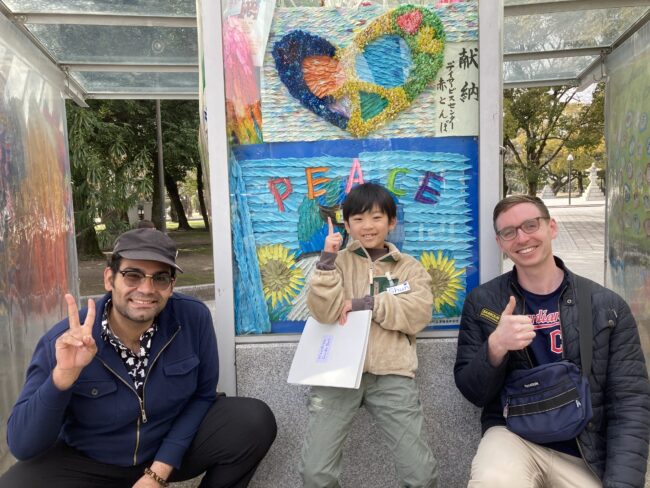
Please scroll down for the English version!
広島の平和記念公園で、海外からの観光客へ英語でボランティアガイドを7歳から始めた佐々木駿くん。11歳の現在までにガイドした数は1500人余り。そして被爆80年となる今年、8月6日の平和記念式典で「平和への誓い」を発表する児童代表に1万400人余りの応募者から選ばれた。
____________________
生まれて7カ月のときにディズニー英語システムという教材を使い始めて、それからずっとそのビデオを見たり、本を読んだりして育ちました。気付いたら言葉が出てきたんだと思います。お母さんが、僕が初めて喋った言葉は「ママ」や「パパ」ではなくて、「Up and Down」だったから驚いたと言っていました。
ガイドを始めたのは小学校1年生の終わりから2年生になるころでした。いつも公園の近くの相生橋を通っていたので原爆ドームを見ていて、「どうしてボロボロなのに壊されずにそのまま残っているのかな?」って思ったんです。それで、お母さんと一緒に調べて、広島に原爆が落とされたということを知りました。僕は小さい頃からお出掛けをするとよく外国人に話しかけていたのですが、あるとき平和記念公園で外国の人と話していたら、お母さんが「きっと興味があって観光に来られていると思うから、この前調べたことを伝えてあげたらいいんじゃないかな?」って。「それ、いいね!」と思って、ちょっと話してみたんです。それ以降、もっと勉強して少しずつ知識を増やしていって、ガイドにつながっていきました。
説明する内容は暗いことで、聞いている人も悲しくなるから、それを少しでも和らげようかなって思ったんです。過去のつらいことを話すけれど、それだけじゃなくて明るい未来を考えていくことも僕は大切だなと思うし、笑うことも僕にとっては平和だからです。
これまで1500人ぐらいにガイドをしました。オーストラリアやアメリカから来た人たちが多いです。「原爆が落とされたのは知っていたけれど、その下でこんなにひどいことが起こったのは知らなかった」と言われます。印象的だったのは、ある学者さんが、「核兵器があるから戦争を防げると思っていた。でもこれは絶対に無くすべきだ」と言ったことです。
みんなが真剣に話を聞いてくれるから続けられます。それから、ガイドを始めたときに、おじいちゃんから、僕のひいおばあちゃんが12歳で被爆したと聞いて、自分の家族に被爆した人がいたと初めて知って、ショックで驚きました。ひいおばあちゃんは瓦礫の下敷きになっているのをお父さんに助けられて、逃げるときに広島に降った黒い雨を見たと聞きました。38歳で乳がん、61歳で大腸がんになって、69歳で亡くなりました。このことも、戦争の恐ろしさをガイドを通して伝えていこうと思うようになった理由です。
ガイドする場所は、勉強して少しずつ増やしています。最近も1カ所増えて全部で7カ所になりました。
誰もが安全に自分らしく暮らすことです。そして、毎日笑って楽しく暮らせる世界になればいいなと思っています。
戦争は良くないということと、それを伝えることが大切だということです。戦争のことを知った人が、それを誰かに伝えれば、どんどん広がっていきます。伝え続けなくてはいけないと思っています。
ある外国人をガイドをしたときに、僕の話を聞いて考え方を変えてくれたというエピソードをもとに、「一つの声でも真実に希望を込めて語れば世界に変化をもたらすことができる。1人1人の力は小さくても伝えていくことが大事」ということを書きました。みんな本当に素晴らしい発表だったので、僕が選ばれたときはすごく嬉しかったです! 今年は被爆80年の節目であり、責任重大ですが、戦争は絶対にダメで、平和が大事なんだということをしっかりと言葉にして伝えたいと思っています。外国人もたくさん見ていると思うので、英語も入れたいです。。
医者になりたいです。おじいちゃんが医者で、コロナのときなど大変な状況でも諦めずに頑張っていたんです。責任を持って働いている姿を見て、僕も医者になりたいと思うようになりました。

Shun Sasaki began volunteering as an English tour guide for international visitors at Hiroshima Peace Memorial Park when he was just seven years old. Now eleven, he has guided more than 1,500 people. This year, marking the 80th anniversary of the atomic bombing, he was selected from over 10,400 applicants to represent children and deliver the “Pledge for Peace” at the Peace Memorial Ceremony on August 6.
– You’ve never lived abroad. How did you become so fluent in English?
When I was seven months old, I started using an English learning program called the Disney World of English. I grew up watching its videos and reading its books. I guess the words just started coming naturally. My mom told me she was surprised because my first words weren’t “Mama” or “Papa,” but “Up and Down.”
– When and why did you start volunteering as an English guide at the Peace Memorial Park?
I started guiding around the end of first grade, just before entering second grade. I would often pass by the Atomic Bomb Dome near Aioi Bridge and wondered, “Why is this crumbling building still here and not torn down?” So my mom and I did some research together, and I learned that an atomic bomb had been dropped on Hiroshima.
Even when I was younger, I liked talking to foreigners we met on outings. One day at the park, I was chatting with some tourists, and my mom said, “They’re probably visiting because they’re interested in this place. Why not share what you just learned?” I thought, “Yeah, that sounds good,” and started telling them a little bit. From there, I kept studying, built up more knowledge, and gradually became a proper guide.
– You often use handmade quiz cards during your tours. Why include quizzes?
The topics I talk about are sad and heavy, so I wanted to lighten the mood a bit for the people listening. Although I talk about painful parts of history, I also think it’s important to look toward a brighter future. To me, smiling is also a form of peace.
– How many people have you guided in the past four years, and what has their reaction been?
So far, I’ve guided about 1,500 people—mostly visitors from countries like Australia and the U.S. Many say things like, “I knew an atomic bomb was dropped, but I had no idea such terrible things happened underneath it.” One moment that really stuck with me was when a scholar said, “I used to think nuclear weapons prevented war, but now I believe they must be abolished.”
– Guiding 1,500 people sounds like a lot of work. What keeps you going?
It’s because people really listen to me seriously. Also, when I started guiding, my grandfather told me that my great-grandmother was exposed to the atomic bomb when she was 12. I had never known that before, and it was a big shock. I learned that she was trapped under rubble but rescued by her father, and saw the black rain that fell over Hiroshima. She was later diagnosed with breast cancer at 38, colon cancer at 61, and passed away at 69. Learning about her experience made me feel I had to share the horrors of war through my guiding.
I’m also gradually expanding the places I guide visitors to. Recently, I added another spot, so now I cover seven locations in total.
– What is your vision of “peace”?
Peace means everyone being able to live safely and be themselves. I hope the world becomes a place where people can smile and enjoy life every day.
– What’s most important to you when giving a tour?
That war is wrong—and that it’s important to keep sharing that message. When someone learns about war and then passes that knowledge on to others, the message keeps spreading. I believe we must continue telling these stories.
– You were chosen to deliver the “Pledge for Peace” at this year’s Peace Memorial Ceremony. What did you write in the essay that got you selected? And what do you hope to share on the day of the ceremony?
I wrote about how, during one of my tours, a foreign visitor said my words changed their way of thinking. Based on that, I wrote: “Even one voice, if it speaks the truth with hope, can change the world. Each of us may seem small, but passing on what we know is vital.” I was so happy when I got selected, especially since everyone’s entries were amazing.
This year marks 80 years since the atomic bombing, so I feel a deep sense of responsibility. I want to clearly express that war is never okay and that peace is essential. Since many foreign visitors will be watching, I want to include some English in my speech too.
– What would you like to be when you grow up?
I want to become a doctor. My grandfather is a doctor, and even during the difficult times of the COVID-19 pandemic, he never gave up and kept working hard. Seeing him work with such responsibility made me want to be like him.
インタビュー:ライトハウスハワイ編集長 大澤陽子
このページは「ライトハウス・ハワイ」 2025年8月号掲載の記事を基に作成しています。